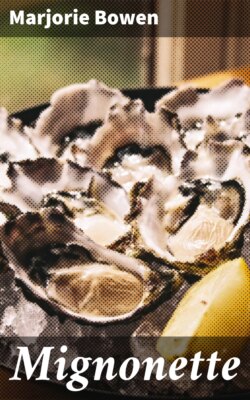Читать книгу Mignonette - Bowen Marjorie - Страница 16
На сайте Литреса книга снята с продажи.
§ 13
ОглавлениеTable of Contents
When the two young women were alone in the heavy cold drawing-room of Stone Hall, Aimée spoke at once.
"You want to know something about me? I was thinking as we drove here, how little you knew."
Barbara murmured a conventional platitude.
"But you must want to know," insisted Aimée. "Surely Mr. Born-past, the only one in possession of this secret, advised you against me?"
"He does not even know I asked you," said Barbara, flushing. "He certainly told me not to interfere."
"With me? Why did you?"
"I thought that I ought to do so—that it was my part." Barbara tried to be honest, and found this difficult, but struggled on. "The whole affair was a shock. I disliked—the arranged marriage. Oh, need we speak of it? I mean—I was lonely, I thought, as there were only two of us—"
"You are very good and sweet," smiled Aimée. "I, also, I am well bred—my mother was always very careful with me. She hoped that one day I might come to England, so I was brought up as an English girl."
"Not in a convent?"
"Oh, no! Always as a philosopher—though I think that sounds different in English—and with an English governess."
"You have not been in England before?" Barbara asked, lamely.
"Oh, no! Mr. Lawne paid us to stay away, that was the understanding, always."
Aimée glanced round the room, and added, "So this was where he lived. From here he wrote those letters!"
"From the office, near the Gun Wharf; I suppose," said Barbara. "I think that we ought to forget it."
"We need not mention it in future," agreed Aimée. "But first we must have everything clear."
She went to the window and glanced curiously out at the garden overcrowded with expensive shrubs and plants, drawing off her musketeer gloves, yellow brown, like her eyes and hair. Barbara saw her clearly now. Her features were most precisely and delicately formed, her eyes wide apart in shadowed sockets, the lines of the lips and nostrils, full, sweeping, and sensitive. Although appearing more than her height because of her slenderness and presence, she was really small and merited her French name.
Barbara thought, Francis will not like her. It was a mistake bringing her here, but I must make the best of it—she is charming, of course.
"Shall I call you Amy?" she asked shyly, but the French girl replied at once:
"Oh, no—Mignonette! I have never been known by any other name."
Barbara was afraid to say that this seemed to her foolish, and offered to show her guest to her room.
"I have no maid," said Aimée. "We have lived very carefully—every sou was to educate me, you understand?"
"Yes," said Barbara awkwardly, wishing that the other would not talk of herself as if she were an investment.
"But was there not—enough?"
"Money? No. Mr. Lawne was also careful. We had to make economies."
Barbara felt ashamed of her father's wealth and her own inheritance.
"We had the promise of the dot—the dowry—he was one to keep his word. We could always trust him."
"You say 'we,' but how long have you known all this? Your mother told you—so young?"
"Naturally. What else was there for me to know? This was all my life, all my fortune. My mother arranged my marriage—so young—to secure the money. He would not pay it before. He wanted to be rid of me."
"I don't think we should discuss this," said Barbara, blushing with the effort of giving a rebuke. "At least not until we know one another."
"I wanted to be candid with you, that is all."
"I do value that. I want to help you if I can."
Barbara could say no more. She felt priggish, dull. She had intended to offer Aimée presents, money, a very handsome contribution toward her marriage, but now she did not know how to put this generosity into words.
"You help me by having me here," smiled Aimée. "It is a great change for me."
"I wish it were gayer. Portsmouth must be dull after Paris."
"A great port is never dull. I saw many officers as we drove along. Presently you will entertain a little?"
"When I am out of mourning? Yes, a little, but we never knew any of the officers."
Aimée ran up to her and slipped her hand under Barbara's arm. Seen close, in her green clothes, she reminded Barbara of a close folded rosebud on a dull spring day, bright, cold, exquisite.
"I should be in mourning also! But I never saw him—and now he is gone I get my dowry."
"You would have had it on your marriage."
"Now I get it without the marriage," smiled Aimée. "Perhaps I put off this marriage."
"Oh, you did not wish for it! That is what I always feared!"
"I don't say that—it is quite a good parti, some day I tell you about him."
